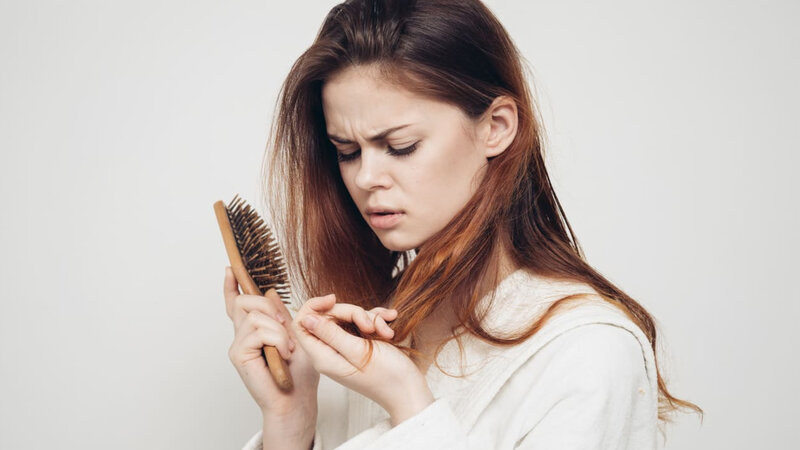Alopecia Totalis Ayurvedic Treatment
Baldness in both men and women can be attributed to various factors, including excessive body heat mixed with phlegm, pollution, chemical-based hair products like shampoos and hair colors, stress, diseases like typhoid, hormonal changes during pregnancy, and hereditary factors.
While baldness was traditionally more prevalent in men, it is now increasingly common in women as well. Hair loss typically begins with receding hairline or thinning on the forehead, but it can also manifest as patches in the center of the scalp or on the crown.
These patches may result from alopecia totalis, which is caused by bacterial and fungal infections that damage the hair follicles. alopecia totalis commonly affects the central part of the scalp but can occur in any area, including facial hair such as a mustache and beard.
Excessive body heat caused by factors like heavy meat consumption, excessive spices, and alcohol intake affects the blood and its circulation to the hair roots.
This heat, combined with phlegm, clogs the hair follicles, hindering regrowth. Additionally, bacterial and fungal infections on the scalp contribute to alopecia totalis, resulting in complete hair loss in specific areas, which often cannot be reversed.
Treating alopecia totalis is challenging, and the only viable option is surgical hair transplantation using hair from donor areas. It’s important to address the underlying causes of hair loss, maintain a balanced diet, and adopt healthy lifestyle practices to minimize the risk of baldness and promote hair regrowth.
Consulting with a healthcare professional can provide personalized guidance and treatment options for individuals experiencing hair loss.
Alopecia Totalis Causes
Alopecia totalis is a type of autoimmune condition that leads to complete hair loss on the scalp. The exact cause of alopecia totalis is not fully understood, but it is believed to be primarily an autoimmune response, where the immune system mistakenly attacks the hair follicles, treating them as foreign invaders. This immune reaction causes inflammation and damage to the hair follicles, leading to hair loss.
Several factors may contribute to the development of alopecia totalis:
1. Genetic predisposition: There is evidence that genetics plays a role in the development of alopecia totalis. Individuals with a family history of autoimmune disorders or alopecia are more likely to be affected.
2. Autoimmune dysfunction: Alopecia totalis is considered an autoimmune disorder, suggesting that an imbalance or dysfunction in the immune system may be a contributing factor. The immune system mistakenly targets and attacks the hair follicles, resulting in hair loss.
3. Environmental triggers: Certain environmental factors or triggers may initiate or exacerbate the immune response in susceptible individuals. These triggers can vary and may include viral or bacterial infections, psychological stress, hormonal changes, or exposure to certain chemicals.
4. Immunological abnormalities: Some studies suggest that individuals with alopecia totalis may have specific immunological abnormalities, such as an imbalance in T-cell function or an overactive immune response.
It is important to note that the exact cause of alopecia totalis can vary from person to person, and further research is needed to fully understand the underlying mechanisms. Treatment options for alopecia totalis are limited, and individuals affected by this condition are advised to consult with a dermatologist or hair specialist for diagnosis and management strategies.
Alopecia Totalis Causes Diet
While there is no specific diet that can directly cure or prevent alopecia totalis, maintaining a balanced and nutritious diet can support overall hair health and potentially contribute to a healthier scalp and hair follicles. Here are some dietary considerations that may be beneficial:
1. Nutrient-rich foods: Include a variety of fruits, vegetables, whole grains, lean proteins, and healthy fats in your diet. These foods provide essential nutrients like vitamins (especially vitamins A, C, and E), minerals (such as zinc and iron), and omega-3 fatty acids, which play a role in maintaining healthy hair.
2. Protein intake: Adequate protein consumption is crucial for hair growth. Include lean sources of protein such as poultry, fish, beans, lentils, and tofu in your meals.
3. Iron-rich foods: Iron deficiency can contribute to hair loss. Incorporate iron-rich foods like spinach, lentils, lean red meat, and fortified cereals into your diet. Consuming vitamin C-rich foods alongside iron sources can enhance iron absorption.
4. Omega-3 fatty acids: Foods rich in omega-3 fatty acids, such as fatty fish (salmon, mackerel), walnuts, chia seeds, and flaxseeds, may help reduce inflammation and support a healthy scalp.
5. Antioxidant-rich foods: Include foods high in antioxidants to help combat oxidative stress and inflammation. Examples include berries, citrus fruits, leafy greens, and colorful vegetables.
6. Hydration: Drink an adequate amount of water daily to maintain overall hydration, which is important for scalp health.
Note: It is important to note that while a balanced diet can support overall hair health, it may not directly treat alopecia totalis.
This condition is primarily an autoimmune disorder, and medical treatments or interventions may be necessary to manage the condition effectively.
If you have alopecia totalis or any concerns about hair loss, it is recommended to consult with a healthcare professional or a registered dietitian who can provide personalized advice based on your specific needs and medical history.
Alopecia Totalis Oil Remedy Recipe
- Combine 300g of Triphala Churna, Bhringraj (Eclipta Alba) leaf juice (300g), and Gingelly (Black Seed) Oil (300g).
- Boil the mixture until the water in the juice evaporates, leaving only the sesame oil blended with the other ingredients.
- Allow the mixture to cool, then strain it and store it in a dark jar.
- Apply this oil to the affected area of alopecia totalis every night and leave it on overnight.
- In the morning, wash the hair with shikakai or Reetha (soapnut) powder. Avoid using chemical-based shampoos.
- Repeat this process for 10 days and observe hair regrowth in the bald patches.
- The duration of treatment may vary based on individual factors such as age and overall health.
It’s important to note that while this oil remedy may be beneficial for some individuals with alopecia totalis, results can vary. It’s advisable to consult with a healthcare professional or a dermatologist for a proper diagnosis and personalized treatment plan.























